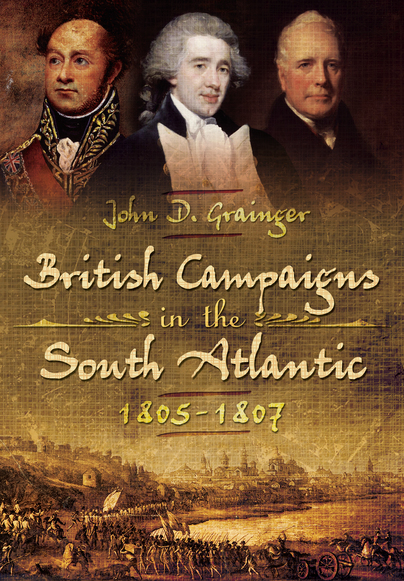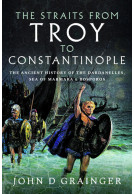British Campaigns in the South Atlantic 1805-1807 (Hardback)
Imprint: Pen & Sword Military
Pages: 277
ISBN: 9781783463640
Published: 30th March 2015
(click here for international delivery rates)
Order within the next 3 hours, 21 minutes to get your order processed the next working day!
Need a currency converter? Check XE.com for live rates
| Other formats available - Buy the Hardback and get the eBook for free! | Price |
|---|---|
| British Campaigns in the South… eBook (4.3 MB) Add to Basket | £6.99 |
Between 1805 and 1807 the British mounted several expeditions into the South Atlantic aimed at weakening Napoleon's Spanish and Dutch allies. The targets were the Dutch colony on South Africa's Cape of Good Hope, which potentially threatened British shipping routes to India, and the Spanish colonies in the Rio de la Plata basin (now parts of Argentina and Uruguay).
In 1805 an army of around 6,000 men was dispatched for the Cape under the highly-respected General David Baird. They were escorted and assisted by a naval squadron under Home Riggs Popham. The Cape surrendered in January 1806.
Popham then persuaded Baird to lend him troops for an attack on Buenos Aires. Buenos Aires was taken in July but the paltry British force (around 2,400 men) was then besieged and forced to surrender in August. Popham was later court martialled for exceeding his orders.
In Feb 1807 Montevideo was taken by a new (officially sanctioned) British force of 6,000 men. Whitelocke, the British Commander then attempted to retake Buenos Aires (not least to free British prisoners from the first attempt) but was defeated by unexpectedly fierce resistance stiffened by armed creoles and slaves. After heavy losses he signed an armistice, surrendering Montevideo and withdrawing all his forces. He too was court-martialled.
One of the major themes of this new account is the strong Scottish connection – Baird and Popham were both Scots, and the 71st Highlanders made up the main force in the Cape and Popham's adventure. Another is the unlooked for consequences of these actions. The arrival of Scottish Calvinist ministers in the Cape influenced the eventual development of apartheid, while successful resistance to the British, with little help from Spain, shaped and accelerated the independence movement in South America.
As featured in.
The Naval Review, May 2016 - Martin Robson
Grainger has produced a detailed study of there obscure British combined operation campaigns. He reviews planning and military activities from the cabinet to company level. While essentially a military history, the important impact of naval activities is clearly recognised.
International Journal of Maritime History Volume 28(2) - Edward M. Furgol
The author has an authoritative command of the primary and secondary sources. For instance, he edited the volume in the Navy Records Society covering the Royal Navy in the River Plate, 1806-1807. The range of documentation he examined is truly impressive, varying from cabinet minutes to correspondence, from regimental records to ship's logs. Certainly, from the British perspective, this work is likely to be definitive...
... Grainger has truly produced a work suitable for a world history course. He treats British political and military history, as well as that of the Napoleonic wars, and south-eastern South America and South Africa. Although useful for academic and post-graduates, the book is also accessible to the general public.
For most historians, Royal Navy activity effectively stopped after the Battle of Trafalgar and the death of Nelson. This has also been true of historical novels, the story then restarting in the run-up to WWI and on into WWII. This new book lifts the covers on two very important Royal Navy campaigns that were part of the dash to Empire that followed the effective neutralization of the navies of France and Spain in 1805. Strongly recommended.
Firetrench
This is a welcome casting of light into a more obscure, if scandalous, corner of history.
Friends of the National Army Museum
Between 1805 and 1807 the British mounted several expeditions into the South Atlantic, aimed at weakening Napoleon's Spanish and Dutch allies. The targets were the Dutch colony on South Africa's Cape of Good Hope, which potentially threatened British shipping routes to India, and the Spanish colonies in Rio de la Plata - nowadays parts of Argentina and Uruguay. In 1805 an army of some 6,000 was despatched for the Cape under the highly respected Lieutenant General David Baird. The force was escorted and supported by a naval squadron under Captain Sir Home Riggs Popham. The Cape surrendered in January 1806. Popham then persuaded General Baird to lend him troops for an attack on Buenos Aires. The city was taken in July, but the British were then besieged and forced to surrender the following month. Popham was subsequently court-martialled for exceeding his orders. In February 1807 Montevideo was taken by a new - officially sanctioned - British army of 6,000 men. Lieutenant General Whitelocke, the British commander, then attempted to retake Buenos Aires but was defeated by unexpectedly fierce resistance. After heavy losses he signed an armistice, surrendering Montevideo and withdrawing his troops. He too was court-martialled. After the success in the Cape, the two expeditions to South America were scandalous blunders that led to the two commanders being put on trial. In this most interesting new book, the author examines these much neglected campaigns and highlights the strong Scottish connection. There are 18 maps and diagrams supporting the text, which is rounded off by notes and references, sources, bibliography and an index.
Military Modelling Magazine
This is a well-researched book in which John Grainger describes the British expedition that seized the Dutch Colony at the Cape of Good Hope on the southern tip of Africa in 1805 and the naval force under Captain Home Riggs Popham RN that transported it... The book is well provided with notes and references, is well indexed and has maps in a section of appendices... For anyone with an interest in the historical background to contemporary problems in the South Atlantic and the nations around its rim, this book will be of interest.
Warship World
This non-fiction book covers the subject matter of Conquest and Betrayal and would be of interest to readers of those titles whose interest is piqued and wish to delve deeper, as well as students of military history in general.
Julian Stockwin
About John D Grainger
JOHN D GRAINGER is a former teacher and historian of great experience with a particular interest in Classical and Hellenistic Greek history. His many previous works include the following for Pen & Sword: Hellenistic and Roman Naval Wars (2011); The Wars of the Maccabees (2012); Roman Conquests: Egypt and Judaea (2013); a three-part history of the Seleukid Empire (2014-16), King’s and Kingship in the Hellenistic World 350-30 BC (2017), Antipater’s Dynasty (2018), Ancient Dynasties (2019, The Roman Imperial Succession (March 2020), The Straits from Troy to Constantinople (2021) and The Forty Sieges of Constantinople (2022). He lives in Evesham, Worcestershire.




















